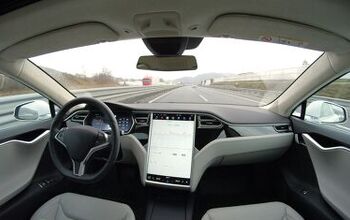Piston Slap: Eye On Ignition Safety Recalls?

Bruce writes:
Sajeev,
A couple of years ago my son bought a 2004 Saturn Ion sedan from a friend of ours. It has about 90,000 miles on the clock and ran fine…until I insisted that he bring it in and get the ignition recall done. A few weeks after the recall work was completed, he was driving on 2 lane road at about 40 miles per hour and the car competely shut down…no power steering, weak power brakes. He was glad he wasn’t going faster & he wrestled the car into a parking lot, let it sit for a while, restarted it and drove home. He called the local GM dealership and they downplayed the incident and told him to bring it in at his convenience.
Now I’m really scared for him. Any advice?
Sajeev answers:
Oh dear. I guess this corner of TTAC couldn’t remain silent on the ignition recall debacle forever. That said, your letter makes me wonder if there’s another problem on this 10-ish year old machine: the Saturn had to “sit for a while” before starting back up?
Are you absolutely, positively sure the ignition switch is to blame?
Bruce replies:
Not sure yet. I’m wondering if they even replaced the switch in the first place. Poor 24 y.o. kid doesn’t have $ to buy another car so he’s stuck with this one. He called Saturn 800 number at my insistence and Saturn called his local Chevy dealer and the service mgr called him and scheduled an appt. The first ignition repair took 2 months and he enjoyed an Altima, which was fine with him, lol. According to Saturn, he’s eligible for another rental. The saga continues….Thanks Sajeev!
Sajeev concludes:
The worst thing you can do now is stress out: nothing good comes from stress when you’re detached from the repair process. That said, I am not a father: I couldn’t possibly understand your anguish. But I can say the problem isn’t hidden in some file cabinet, locked in a dark room in the RenCen. Everyone is watching and there’s a system in place to fix the problem.
Every company goes into super-customer-service-savvy crisis mode in times like these. And here’s the plan to mitigate the crisis:
And this is cold comfort to you, sadly. A high level infographic isn’t reassuring when you must go through the steps again. Luckily GM is willing to put your son in another rental, just make sure your son does step #1 and #2 until he’s in that rental.
Then have the dealer report back with a diagnosis. If you don’t like the diagnosis/resolution…well, perhaps we should just hope that the problem is found and fixed. Running through the plethora of scenarios only increases the stress level, it doesn’t help one iota.
How would you handle this, Best and Brightest?
[Image: Shutterstock user Olivier Le Moal]

More by Sajeev Mehta
Latest Car Reviews
Read moreLatest Product Reviews
Read moreRecent Comments
- W Conrad I'm not afraid of them, but they aren't needed for everyone or everywhere. Long haul and highway driving sure, but in the city, nope.
- Jalop1991 In a manner similar to PHEV being the correct answer, I declare RPVs to be the correct answer here.We're doing it with certain aircraft; why not with cars on the ground, using hardware and tools like Telsa's "FSD" or GM's "SuperCruise" as the base?Take the local Uber driver out of the car, and put him in a professional centralized environment from where he drives me around. The system and the individual car can have awareness as well as gates, but he's responsible for the driving.Put the tech into my car, and let me buy it as needed. I need someone else to drive me home; hit the button and voila, I've hired a driver for the moment. I don't want to drive 11 hours to my vacation spot; hire the remote pilot for that. When I get there, I have my car and he's still at his normal location, piloting cars for other people.The system would allow for driver rest period, like what's required for truckers, so I might end up with multiple people driving me to the coast. I don't care. And they don't have to be physically with me, therefore they can be way cheaper.Charge taxi-type per-mile rates. For long drives, offer per-trip rates. Offer subscriptions, including miles/hours. Whatever.(And for grins, dress the remote pilots all as Johnnie.)Start this out with big rigs. Take the trucker away from the long haul driving, and let him be there for emergencies and the short haul parts of the trip.And in a manner similar to PHEVs being discredited, I fully expect to be razzed for this brilliant idea (not unlike how Alan Kay wasn't recognized until many many years later for his Dynabook vision).
- B-BodyBuick84 Not afraid of AV's as I highly doubt they will ever be %100 viable for our roads. Stop-and-go downtown city or rush hour highway traffic? I can see that, but otherwise there's simply too many variables. Bad weather conditions, faded road lines or markings, reflective surfaces with glare, etc. There's also the issue of cultural norms. About a decade ago there was actually an online test called 'The Morality Machine' one could do online where you were in control of an AV and choose what action to take when a crash was inevitable. I think something like 2.5 million people across the world participated? For example, do you hit and most likely kill the elderly couple strolling across the crosswalk or crash the vehicle into a cement barrier and almost certainly cause the death of the vehicle occupants? What if it's a parent and child? In N. America 98% of people choose to hit the elderly couple and save themselves while in Asia, the exact opposite happened where 98% choose to hit the parent and child. Why? Cultural differences. Asia puts a lot of emphasis on respecting their elderly while N. America has a culture of 'save/ protect the children'. Are these AV's going to respect that culture? Is a VW Jetta or Buick Envision AV going to have different programming depending on whether it's sold in Canada or Taiwan? how's that going to effect legislation and legal battles when a crash inevitibly does happen? These are the true barriers to mass AV adoption, and in the 10 years since that test came out, there has been zero answers or progress on this matter. So no, I'm not afraid of AV's simply because with the exception of a few specific situations, most avenues are going to prove to be a dead-end for automakers.
- Mike Bradley Autonomous cars were developed in Silicon Valley. For new products there, the standard business plan is to put a barely-functioning product on the market right away and wait for the early-adopter customers to find the flaws. That's exactly what's happened. Detroit's plan is pretty much the opposite, but Detroit isn't developing this product. That's why dealers, for instance, haven't been trained in the cars.
- Dartman https://apnews.com/article/artificial-intelligence-fighter-jets-air-force-6a1100c96a73ca9b7f41cbd6a2753fdaAutonomous/Ai is here now. The question is implementation and acceptance.


































Comments
Join the conversation
The advice, even if it seems like cya snark from GM, is solid. My wife, who knows nothing about cars except the operation of same, gave me grief about putting all my keys on the ignition key ring, so I finally listened. She was right.
I say dust off and nuke the Saturn from orbit - it's the only way to be sure...